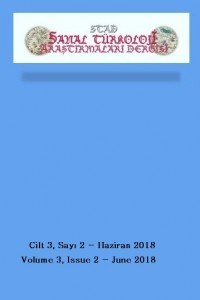ONE OF THE WORD-FORMATION WAYS IN TURKISH: UPDATING
Türkçenin söz varlığının büyük bir bölümünün ad veya fiil köklerine getirilen son eklerle yapılmış eklemelerden oluştuğu görülür. İki veya daha fazla sözcüğün bir araya gelerek yeni ve farklı bir kavramı karşılayacak yeni sözcükler oluşturmasıyla birleştirme yoluyla yapılan birleşik sözcükler, iki veya daha fazla sözcüğün başharfleştirmesiyle, belirli ses öbeklerinin karmasıyla veya kırpmasıyla elde edilen kısaltmalar Türkçenin söz yapma yollarındandır. Her dilde olduğu gibi diğer dillerden yapılan ödünçlemelerle de Türkçenin söz varlığına çeşitli dillerden sözcükler katılmıştır. Bu söz yapma yollarının yanı sıra yerlileştirme, örnekseme, tür değiştirme, ikileme, uydurma ve yeni öge, titremleme, genelleşme, eksiltme, derleme ve tarama, geri oluşum ile Türkçenin söz varlığına az veya çok sözcük katılmıştır. Söz yapım yolları içerisinde yerlileştirme başlığı altında ele aldığımız ancak kaynakları ve yöntemleri bakımından bazı yönleriyle ondan ayrılan söz oluşum yollarından biri de güncellemedir. Güncelleme, bu özellikleri dolayısıyla diğer söz yapım yollarından ayrılır. Her şeyden önce güncelleme söz oluşum sürecidir. Yeni bir sözcük veya yeni bir terim türetme gibi bir gereksinim sonucunda söz yapım yollarına başvurularak türetilen sözler gibi değildir. Dilde zaten var olan, kullanılmakta olan bir sözcüğün bir bölümünün veya tamamının zamanla anlaşılmaz ve çözümlenemez olması, kısacası geçirimsizleşmesi üzerine bu sözün sesçe, anlamca yapıca benzer bir sözcükle değiştirilmesi olayıdır.
Anahtar Kelimeler:
söz yapımı, köken yakıştırma, yerlileştirme, güncelleme, Türkçe
ONE OF THE WORD-FORMATION WAYS IN TURKISH: UPDATING
The large part of the Turkish vocabulary consists of affixations formed with the end suffixes added to the roots of nouns or verbs. Compound words are made by combining two or more words together to form new words to meet a new and different concept and abbreviations are made by the initialism/acronym of two or more words. Blending or clipping, shortening of certain groups of phones are other ways of word formation in Turkish. As in every language, words from various languages have been added to Turkish vocabulary through borrowings. In addition to these ways of word formation, many or a few words have been added to Turkish vocabulary through localization, analogy, conversion, duplication, coinage and neologism, intonation, generalization, ellipsis, compiling and scan and backformation. One of the ways of word formation that we have dealt with is localization, but it differs from localization in terms of its sources and methods, and it is called updating. Both borrowings can be localized under the influence of the characteristics of the recipient language in terms of phonetic features. Updating is therefore different from other word coinage methods by these features. First of all updating is the word formation process. It is not like the words derived by means of word coinage methods as a result of necessity such as the derivation of a new word or a new term. It is the changing of a part or the whole word, which is already in a language and in use and which has become opaque over time with another word that is similar in terms of pronunciation, meaning and structure
Keywords:
word-formation, folk-etymology, localization, updating, Turkish,
- ISSN: 1301-9155
- Yayın Aralığı: Yılda 2 Sayı
- Başlangıç: 1996
- Yayıncı: Şükrü Haluk AKALIN
Sayıdaki Diğer Makaleler
ONE OF THE WORD-FORMATION WAYS IN TURKISH: UPDATING
SOVYETLER BİRLİĞİNİN İLK YILLARINDA TÜRKMENİSTAN’DA DİL - ŞİVE TARTIŞMALARI (I. KAYNAKLAR)
BEŞİNCİ SAYISI DOLAYISIYLA STAD VE ETKİNLİKLERİMİZ
1980 VE 1990’LI YILLARDA “KİRPİ” MİZAH DERGİSİNDE YAYIMLANMIŞ SİYASAL KONULU KARİKATÜRLER
